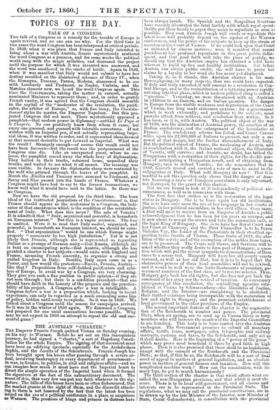TOPICS OF THE DAY.
TALK OF A CONGRESS.
THE talk of a Congress as a remedy for the trouble of Europe is again revived, and no one can see why. For the third time in two years the word Congress has been interposed at critical periods. In 18.59, when it was plain that France and Italy intended to bring about a war with Austria, Russia mysteriously muttered the word Congress as a panacea, and for some weeks the political world rang with the magic syllables, and discussed the project until the purpose for which it was invented was answered, and the word was smothered in the smoke of battle. Again in 1859, when it was manifest that Italy would not submit to have her destiny moulded on the disinterred schemes of Henry IV. when the Romagna, Tuscany, Parma, Modena, clamoured to im one with Lombardy and Piedmont, as Naples Umbria, and the Marches clamour now, we heard the word Naples, again. This time the Governments, taking the matter in earnest, actually nominated Ministers to represent them ; and, in order to gratify French vanity, it was agreed that the Congress shonld assemble in the capital of the "moderator of the revolution, the pacifi- cator, the arbiter of Europe," as, with fine irony, the Constitu- tionnel styles its master, the Emperor Napoleon. But this pro- jected Congress did not meet. There mysteriously appeared a pamphlet--that modern power in diplomacy—entitled Le Pape et Is Congree. No one positively knew from whom it came, but eyery one guessed, and guessed with tolerable correctness. If not written with an Imperial pen if not actually representing Impe- rial ideas, it was written to older, and it represented ideas deemed at that moment desirable to put forward as Imperial. What was the result ? Strangely enough—of course this result could not have been foreseen—but the result was the postponement of the Congress sine die. Like an unexpected guest, whom no one loves, the pamphlet seared away the whole bevy of diplomatists. They halted in their tracks, returned home, unpacked their trunks, and waited to see what it all meant. The meaning was soon visible. In January the diplomatic sheep were scattered by the wolf who grinned through the leaves of the pamphlet. In March the 2Emilia and Tuscany were annexed to Piedmont, and Savoy and Nice passed into the hands of France. Whatever a Congress might have had to say to the former transactions, we know well what it would have said to the latter. So there was no Congress.
Now we have the old proposal for the third time. The beau ideal of the instructed journalists of the Constitutionnel is, that France should appear as the moderator in a Congress, the indi- cator of that compromise which is the condition of the reestablish- ment of Italy. What does this mean ? The sale of Venetia ? It is admitted that "Italy, organized and powerful, is henceforth an European interest." But this is a vague sentence. The how is omitted. Were it to read that Italy united, organized, and powerful, is henceforth an European interest, we should be satis- fied. "That organization" would be one which Europe might properly "consecrate by her high jurisdiction." Yet it is -not likely that Prussia, although she is represented as regarding Italian as a presage of German unity—that Russia, although she is bent on emancipating serfs—that Austria, although she has granted a oharter to her subjects—would unite with England and Franoe, assuming French sincerity, to organize a ' strong and united kingdom in Italy. Besides, Italy must come in as a Power, and how would the protesters—Russia, Prussia, Austria— like that ? Propositions from self-dubbed paeificators and arbi- ters of Europe, to avoid war by a Congress, are very charming. They give you such a fine position in public opinion—if they are not seen through ; but there is a condition precedent--that one should have faith in the honesty of the proposer and the practica- bility of his project. A Congresa after a war is intelligible. A Congress before a war is a proposition which, looking to recent experience, can only be regarded as a mask concealing some line of policy, hidden until ready to explode. Se it was in 18.59. We talked about a Congress until the season for campaigns arrived. So it was in the winter of 1859 again. We discussed. a Congress, and prepared for one until annexations became possible. 'Why inay we not expect in 1860 an attempt to repeat the old and suc- cessful game ?


























 Previous page
Previous page